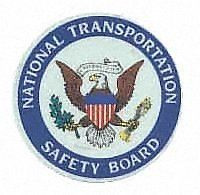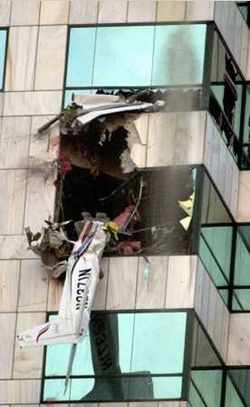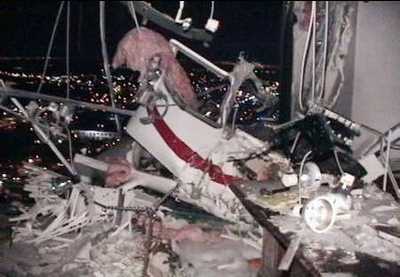Mon, Jan 20, 2003
 The final NTSB report on the sad story of Tampa
teen flyer, Charles Bishop, was filed late Friday. Bishop, 15,
stole a Cessna 172R from a Clearwater flight school, crashing it
into the 28th floor of the Bank of America Plaza in downtown Tampa,
January 5, 2002.
The final NTSB report on the sad story of Tampa
teen flyer, Charles Bishop, was filed late Friday. Bishop, 15,
stole a Cessna 172R from a Clearwater flight school, crashing it
into the 28th floor of the Bank of America Plaza in downtown Tampa,
January 5, 2002.
To no one's surprise, the NTSB has ruled the teen's death a
suicide.
The NTSB stated, "The student pilot was instructed by his flight
instructor to preflight the Cessna 172R airplane and then wait for
the instructor before beginning the training flight.
 Witnesses stated that the student pilot proceeded to the
airplane, removed the wing tie-downs, boarded the airplane, started
the engine, and immediately taxied to runway 35R without the flight
instructor. The student pilot then took off from the runway without
communicating with the airport Air Traffic Control (ATC) tower. The
tower controllers stated that the airplane turned to the right and
headed toward the southeast immediately after takeoff. No
transponder signal was received from the airplane. The tower
controllers notified Tampa ATC approach controllers, and they also
notified the pilots of a Coast Guard helicopter that was flying in
the local area. Additionally, the controllers made numerous
attempts to contact the pilot by emergency radio frequency, but
were unsuccessful. The Coast Guard helicopter pilots were asked to
intercept the airplane. The airplane proceeded to a local Air Force
military base and over flew the base control tower, two aircraft,
and three hangars at a low altitude. The airplane was then observed
to alter its heading toward a tall office building in the city of
Tampa. While en route to the building, the Coast Guard helicopter
pilots intercepted the airplane and attempted to signal the pilot
to land. According to the helicopter pilots, the student pilot saw
their hand gestures and gestured back to them; however, the
helicopter pilots could not determine the kind and meaning of the
gestures that the student pilot exhibited. Shortly thereafter, the
airplane impacted the office building at the 28th-floor level. An
examination of the airframe, systems, and engine did not reveal any
evidence of preimpact mechanical malfunction. No indications of
ethanol or drugs were found in specimens taken from the student
pilot. A 2-page suicide note was found on the student pilot’s
person."
Witnesses stated that the student pilot proceeded to the
airplane, removed the wing tie-downs, boarded the airplane, started
the engine, and immediately taxied to runway 35R without the flight
instructor. The student pilot then took off from the runway without
communicating with the airport Air Traffic Control (ATC) tower. The
tower controllers stated that the airplane turned to the right and
headed toward the southeast immediately after takeoff. No
transponder signal was received from the airplane. The tower
controllers notified Tampa ATC approach controllers, and they also
notified the pilots of a Coast Guard helicopter that was flying in
the local area. Additionally, the controllers made numerous
attempts to contact the pilot by emergency radio frequency, but
were unsuccessful. The Coast Guard helicopter pilots were asked to
intercept the airplane. The airplane proceeded to a local Air Force
military base and over flew the base control tower, two aircraft,
and three hangars at a low altitude. The airplane was then observed
to alter its heading toward a tall office building in the city of
Tampa. While en route to the building, the Coast Guard helicopter
pilots intercepted the airplane and attempted to signal the pilot
to land. According to the helicopter pilots, the student pilot saw
their hand gestures and gestured back to them; however, the
helicopter pilots could not determine the kind and meaning of the
gestures that the student pilot exhibited. Shortly thereafter, the
airplane impacted the office building at the 28th-floor level. An
examination of the airframe, systems, and engine did not reveal any
evidence of preimpact mechanical malfunction. No indications of
ethanol or drugs were found in specimens taken from the student
pilot. A 2-page suicide note was found on the student pilot’s
person."

The National Transportation Safety Board determines the probable
cause(s) of this accident as follows: The pilot's
unauthorized use of an aircraft for the purpose of commiting
suicide.
Bishop's family is suing the manufacturer of the acne drug
Accutane for $70 million last April. They claim that the medication
prompted his suicide and that the drug caused severe psychosis.
More News
“We respectfully call on the City of Mesa to: 1. Withdraw the landing fee proposal immediately 2. Engage with the aviation community before making decisions that impact safet>[...]
High Speed Taxiway A long radius taxiway designed and provided with lighting or marking to define the path of aircraft, traveling at high speed (up to 60 knots), from the runway ce>[...]
Aero Linx: International Federation of Airworthiness (IFA) IFA uniquely combines together all those with responsibility for policies, principles and practices concerned with the co>[...]
Controller’s Expectation That VW02 Would Have Departed Sooner Led To An Inadequate Scan And Loss Of Situational Awareness Analysis: A Robinson R-44 helicopter N744AF, VW02 (V>[...]
A Few Questions AND Answers To Help You Get MORE Out of ANN! 1) I forgot my password. How do I find it? 1) Easy... click here and give us your e-mail address--we'll send it to you >[...]
 Aero-News: Quote of the Day (12.09.25)
Aero-News: Quote of the Day (12.09.25) ANN's Daily Aero-Term (12.09.25): High Speed Taxiway
ANN's Daily Aero-Term (12.09.25): High Speed Taxiway ANN's Daily Aero-Linx (12.09.25)
ANN's Daily Aero-Linx (12.09.25) NTSB Final Report: Diamond Aircraft Ind Inc DA20C1 (A1); Robinson Helicopter R44
NTSB Final Report: Diamond Aircraft Ind Inc DA20C1 (A1); Robinson Helicopter R44 ANN FAQ: Q&A 101
ANN FAQ: Q&A 101





